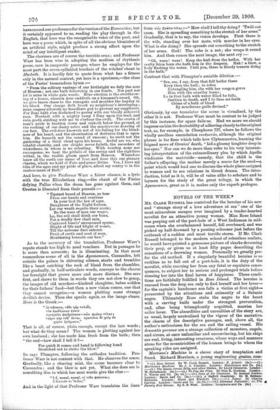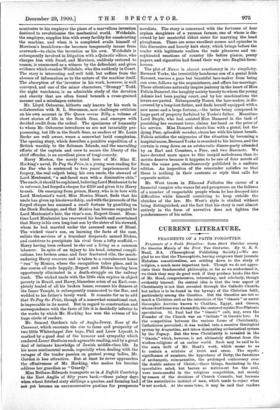NOVELS OF T.11..B4 WEEK.* Mn. CLARK RUSSELL has contrived for
the heroine of his new and "strange story of a love adventure at sea" one of the most miraculous escapes ever imagined by a tender-hearted novelist for an attractive young woman. Miss Rose Island was peeping out of the port-hole of a West Incliaman in mid.. ocean when she overbalanced herself, fell overboard, and was picked up half-drowned by a passing schooner just before the outbreak of a sudden and most terrific storm. If Mr. Clark Russell belonged to the modern school of relentless realists, he would have painted a gruesome picture of sharks devouring their prey, or given us at least fifty pages describing the sensations of a drowning woman. Personally we greatly pre- fer the old method. If a singularly beautiful heroine is so reckless as to fall out of a port-hole, it is the duty of the novelist, while rescuing her from any fatal or repulsive conse- quences, to subject her to serious and prolonged trials before steering her into the final haven of happiness. These condi- tions are faithfully fulfilled in Rose Island. The heroine is rescued from the deep sea only to find herself and her lover— for the captain's handsome son falls a victim at first sight— persecuted by the attentions and animosity of a Satanic negro. Ultimately Rose stabs the negro to the heart with a carving knife under the strongest provocation, and, after being triumphantly acquitted, marries her sailor lover. The absurdities and unrealities of the story are, as usual, largely neutralised by the vigour of the narrative, the charm of the descriptive passages, and, above all, the author's enthusiasm for the sea and the sailing vessel. His dramatis persona are a strange collection of monsters, angels, and sirens, at once unfamiliar and unconvincing, but his ships are real, living, interesting creatures, whose ways and manners atone for the eccentricities of the human beings to whom the speaking roles are assigned.
Morrison's Machine is a clever story of temptation and fraud. Richard Morrison, a young engineering genius, corn- • (1.) Bose Island. By W. Clark RusselL London: E. Arnold. [6s.]—(1) Morrison's Machine. By J. S. Fletcher. London: Hutchinson and Co. [6s.] —(3.) The Queen versus Billy, and other Stories. By Lloyd Osboarne. London : W. Heinemann. [68.)—(4.) To Pay the Price. By Silas K. Rocking. London : F. Warne and Co. (Ss. 6d.)—(5.) Sons of the Covenant. By Samuel Gordon. London: Sands and Co. (68.1-03.) A Suffolk Courtship. By M. Betham. Edwards. London: Hurst and Blackett. [8s.]—(7.) -Nance. By Charles Garvice. London: Sands and Co. (Ss. ed.]—(8.) Edmund Pulleston ; or, The ss Family EMI Genius. By B. B. West. London: Longman s and Co. (68.1
municates to his employer the plans of a marvellous invention destined to revolutionise the mechanical world. Wridsdale, the employer, supplies him with every facility for constructing the machine, and when it is completed avails; himself of Morrison's breakdown—he becomes temporarily insane from overwork—to claim the invention as his own. Wridsdale is subsequently involved in litigation with a Quixotic editor, who charges him with fraud, and Morrison, suddenly restored to reason, is summoned as a witness by the defendant, and gives evidence which crushes Wridsdale, who dies suddenly in Court. The story is interesting and well told, but suffers from the absence of information as to the nature of the machine itself. The absorption of the• inventor in his work, however, is well conveyed, and one of the minor characters, " Stumpy " Todd, the night watchman, is an admirable study of the devotion and charity that are often found beneath a cross-grained manner and a misshapen exterior.
Mr. Lloyd Osbourne, hitherto only known by his work in collaboration with R. L. Stevenson, now challenges criticism on his own account in The Queen versus Billy, a volume of short stories of life in the South Seas, and emerges with decided credit from the ordeal. The specimens of humanity to whom Mr. Osbourne introduces us are not invariably pre- possessing, but life in the South Seas, as readers of Mr. Louis Becke are well aware, wears a somewhat lurid complexion. The opening story, which describes a punitive expedition of a British warship to the Solomon Islands, and the unavailing efforts of the captain and crew to secure the liberty of the chief offender, is an excellent piece of tragi-comedy.
Harry Morton, the sorely tried hero of Mr. Silas K. Hocking's novel, To Pay the Price, is a young man reading for the Bar who is sentenced to two years' imprisonment for forgery, the real culprit being his own uncle, the steward of Lord Menheniot, "a sad-faced man with a diminutive chin." The uncle, it should be explained, believing Lord Menheniot to be in extremis, had forged a cheque for £250 and given it to Harry to cash. On emerging from prison, Harry, who is in love with Lord Menheniot's ward, Miss Monica Stuart, finds that his uncle has given up his stewardship, andwith the proceeds of the forged cheque has amassed a small fortune by gambling on the Stock Exchange, and that Monica has become engaged to Lord Menheniot's heir, the vicar's son, Rupert Grant. Mean- time Lord Menheniot has recovered his health and ascertained that Harry is his own long-lost son by the sister of his steward, whom be bad married under the assumed name of Blunt. The wicked vicar's son, on learning the facts of the case, enlists the services of a truculent desperado named Blokes, and contrives to precipitate his rival from a lofty scaffold,— Harry having been reduced to eke out a living as a common labourer. In spite of an injury to his head, internal compli- cations, two broken arms, and four fractured ribs, the much- enduring Harry recovers and is taken to a convalescent home "run" by Monica, where the recognition takes place, and in due course all ends happily, Rupert and Blokes having been opportunely eliminated in a death-straggle on the railway track. The wicked uncle with the little chin expires in abject poverty in Brazil, and Harry, blameless scion of an Earl, com- pletely healed of all his broken bones, resumes his dinners at the Inner Temple, is subsequently summoned to the Bar, and wedded to his father's lovely ward. It remains for us to add that To Pay the Price, though of a somewhat sensational cast, is impeccable in its moral. But in regard to construction and correspondence with the facts of life it is decidedly inferior to the works by which Mr. Hocking has won the esteem of his huge circle of readers.
Mr. Samuel Gordon's tale of Anglo-Jewry, Sons of the Covenant, which recounts the rise to fame and prosperity of two little Whitechapel Jew boys, Phil and Leuw Lipcott, is marked by a good deal of the humour and sympathy which rendered Lesser Destinies such agreeable reading, and by a great deal of intimate knowledge of Jewish middle-class life. In his more sentimental moods, especially when dealing with the ravages of the tender passion on genteel young ladies, Mr. Gordon is less attractive. But at least he never approaches the effusiveness of Mr. Hocking, who makes his heroine address her guardian as " G-uardy."
Miss Betham-Edwards transports us in A Suffolk Courtship to the East Anglia of fifty years back,—those palmy days when wheat fetched sixty shillings a quarter, and farming had not yet become an unremunerative pastime for prosperous novelists. The story is concerned with the fortunes of four orphan daughters of a yeoman farmer, one of whom is dis- owned by her masterful eldest sister for marrying the head ploughman. There are some excellent scenes and episodes in this discursive and loosely knit story, which brings before the reader with legitimate realism the rude pleasures and un- sophicated emotions of country life before pianos, penny papers, and cigarettes had found their way into English farm- houses.
The plot of Nance is almost reactionary in its simplicity. Bernard Yorke, the irresistibly handsome son of a genial Irish Baronet, rescues a poor but beautiful lace-maker from being run over, follows up the acquaintance, and offers her marriage. These attentions naturally inspire jealousy in the heart of Miss Felicia Damerel, the haughty society beauty to whom the young Adonis had been paying court, and by her machinations the lovers are parted. Subsequently Nance, the lace-maker, is dis- covered by a long-lost father, and finds herself equipped with a new name and a large fortune,—the latter being composed in large part of property forfeited by Yorke's father. Meantime Lord Stoyle, who had assisted Miss Damerel in the task of punishing her recreant lover, claims her hand as the price of his service. Miss Damerel shoots him with a pistol, but the dying Peer, splendide mendax, clears her with his latest breath. Felicia satisfies the exigencies of the situation by becoming a hospital nurse, Bernard Yorke is reunited to his heiress, and the curtain is rung down on an aristocratic dinner-party attended by an Earl and Countess, a Peer, and two Baronets. We have devoted more space to this insipid melodrama than its merits deserve because it happens to be one of four novels all from the same pen, simultaneously published in a uniform edition. An inspection of the remainder satisfies us that there is nothing in their contents or style that calls for separate notice.
Mr. West traces in Edmund Fulleston the career of a financial vampire who waxes fat and prosperous on the failures of a number of respectable people whom he has decoyed into difficulties while himself contriving to keep outside the clutches of the law. Mr. West's style is studied without being distinguished, and the fact that his story is cast almost entirely in the form of narrative does not lighten the ponderousness of his satire.



































 Previous page
Previous page